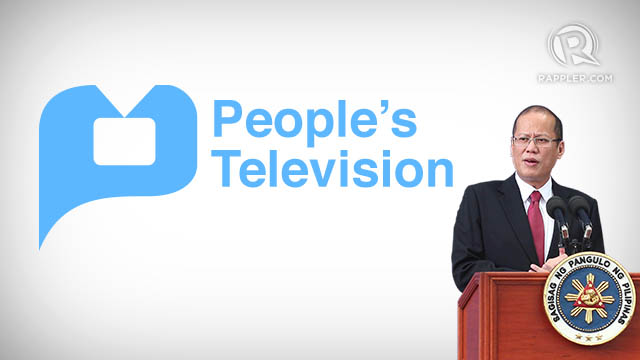SUMMARY
This is AI generated summarization, which may have errors. For context, always refer to the full article.

MANILA, Philippines – President Benigno S. Aquino III signed into law a measure that will “revitalize” the operations of state-owned and -operated television station People’s Television Network, Inc. or PTV-4.
“I am happy to announce that President Aquino signed into law Republic Act 10390, an Act Revitalizing the People’s Television Network, on March 14,” Communications Secretary Herminio Coloma, Jr. said in a Malacañang press conference on Wednesday, March 20.
RA No. 103901 amends RA No. 7306 and is called “An Act Providing for the Establishment of the People’s Television Network, Incorporated, Defining Its Powers and Functions, Providing for Its Sources of Funding and for Other Purposes.”
GMA Network, Inc. strongly opposed the government’s plan to privatize state-owned broadcast station People’s Television Network, Inc. (PTV) as it would be unfairly competing with private players
Coloma said the new law addresses two main problems of PTV-4: the “financial hemorrhage” marked by the depletion of the station’s capital and the lack of a stable source of income.
P5-B fresh capital unfair?
The new charter for PTV-4 provides for a fresh capital infusion of P5 billion.
Out of this, P3 billion would be sourced from the General Appropriations Act in the next 3 years — P1 billion every year.
The P2 billion remainder will be sourced from revenue generated from advertising and airtime sales.
“So it was important that the new law provided for new capitalization and permitted the network to generate commercial revenues, so that there will be a stable source of sustenance for the network,” Coloma stressed.
These provisions were the subject of a complaint expressed in December 2012 by Felipe L. Gozon, chair of GMA-7 operator GMA Network Inc.
Gozon had said it is “very unfair” that PTV-4 will receive funds from the national budget derived from the taxes collected from and paid by taxpayers, which include commercial broadcasters.
While receiving subsidies from the taxes and fees paid by broadcasting institutions, the network will be competing with the same companies for the source of income providing the said funds: commercial ads and airtime.
Gozon had claimed that PTV-4 will have the upper hand in competing with the private sector in terms of generating ad revenue since the state-funded competitor can provide airtime value at lower rates, which may diminish the ability of private broadcasters to attract ad revenues.
“If they want to sell airtime then they have to remove the subsidy. We pay billions in taxes and part of those taxes will be used by PTV 4,” stressed Gozon.
Advisory council
Meantime, Coloma said that the new law also provides for the nomination of members for an advisory council “to advise the network on relevant programming that will bolster the character of PTV as a public service broadcasting network.”
The council will also help stir the network in shifting of focus toward a “new global best practice of public service broadcasting which means that government television becomes an active partner or an active instrument for promoting the public welfare.”
“So, with the enactment of the new PTV law, we hope to broaden the participation of the citizens in having a network that will mirror their aspirations. We want to invite the various sectors to give concrete suggestions on programs that will be beneficial to the community and to society. That is the rationale for the formation of an advisory council,” Coloma said.
He said it was President Aquino who directed the crafting of a proposed bill, which was later included in the priority list of the Legislative-Executive Development Advisory Council (LEDAC).
No telenovelas
Programs on PTV-4 would allow block time programming (the scheduling of similar television programs back-to-back) “provided that it is focused on education, history, propagation of Philippine culture and quality entertainment.”
He added that the majority of programs would focus on “news and public information.”
Entertainment shows, on the other hand, will not “compete directly” with private stations’ programs.
“We do not intend to produce entertainment shows like the telenovela of the type that they have produced. Perhaps we can have a telenovela featuring the heroism of our Medal of Valor or Gold Cross awardees, or of the Dangal ng Bayan awardees of the civil service, or outstanding public school teachers, outstanding policemen, soldiers,” Coloma said.
“Telenovelas that will edify the nobility of the Filipino public servant, that will be our orientation, not the telenovela that is commercially available at present. So it is farthest from our intention to compete directly with private media,” he added.
New technology
He said that the new law will “also enable the network to keep abreast with latest technological developments” such as digital television and transmission upgrades to improve signal quality.
“We all know that by 2015, the ASEAN standard will be digital television. We have made some acquisitions of basic digital equipment in our studios now but we need to do more. Of course, we are still awaiting the promulgation of official policy on digital television but we’re confident that we can keep abreast with the rest of ASEAN and with the commercial broadcasting industry,” Coloma said.
“Because when digital transmission is fully in place, we will also be able to multiply the channels of government television — from one free TV station to at least two more cable stations — and we may be able to dedicate the cable stations to educational programming or cultural programming. There are also those who say that we should have programs on Philippine history and culture,” he said.
RA 103901 is a consolidation of Senate Bill No. 3316 and House Bill No. 6703 passed by the Senate and House of Representatives on January 21, 2013 and December 19, 2012, respectively. – Rappler.com
Add a comment
How does this make you feel?
There are no comments yet. Add your comment to start the conversation.